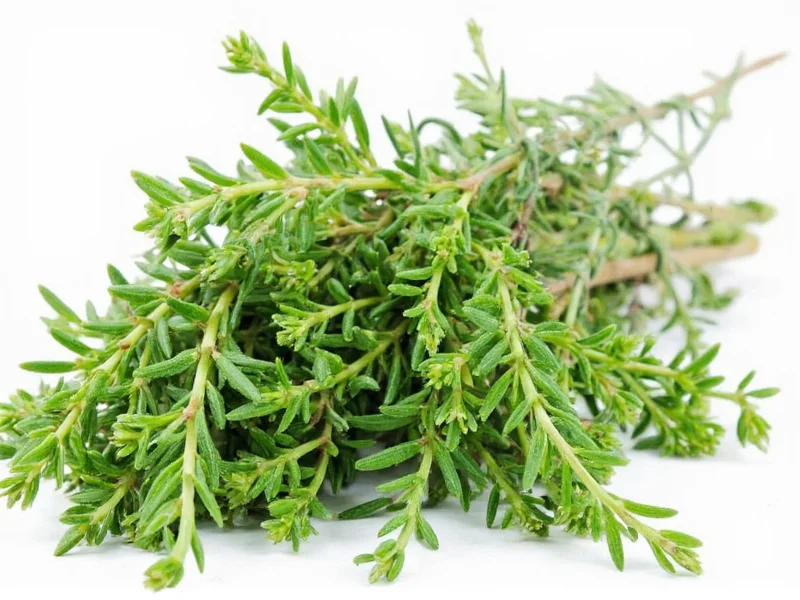Understanding herb substitutions becomes essential when following recipes that call for thyme, whether you've run out of this versatile herb or seek alternatives for dietary reasons. Thyme's distinctive flavor profile—earthy with subtle floral and lemon notes—makes it challenging to replace perfectly, but several herbs can effectively stand in depending on your specific culinary needs.
Top Herbs Similar to Thyme
Oregano: The Closest Flavor Match
Oregano shares thyme's Mediterranean heritage and earthy characteristics, making it the most reliable substitute. While oregano has a slightly more pungent, peppery quality, it works exceptionally well in tomato-based dishes, roasted vegetables, and meat preparations where thyme would typically shine. When substituting dried oregano for dried thyme, maintain equal measurements. For fresh herbs, use three parts fresh oregano to four parts fresh thyme to prevent overpowering your dish.
Marjoram: The Milder Alternative
Often called "sweet thyme," marjoram provides a gentler flavor profile with sweeter, citrusy notes. This makes it ideal for delicate dishes like fish preparations, egg dishes, or light sauces where traditional thyme might dominate. Marjoram's subtle nature means you can generally substitute it measure for measure with thyme, though some chefs prefer increasing marjoram by 25% to compensate for its milder intensity.
Rosemary: For Heartier Applications
Rosemary shares thyme's pine-like herbal quality but delivers a much stronger, more assertive flavor. This makes it suitable for robust dishes like roasted meats, hearty stews, and rustic breads. When substituting rosemary for thyme, use only one-third the amount, as its potency can easily overwhelm a dish. Finely mince fresh rosemary to distribute its flavor more evenly throughout your preparation.
Sage: The Unexpected Substitute
While not an obvious choice, sage works surprisingly well as a thyme substitute in certain applications, particularly with poultry, pork, and autumnal dishes. Its earthy, slightly peppery flavor with eucalyptus notes complements similar flavor profiles to thyme. Use half the amount of sage compared to thyme, as its distinctive flavor can dominate if overused.
| Herb Substitute | Flavor Comparison to Thyme | Best Recipe Applications | Substitution Ratio (Fresh) |
|---|---|---|---|
| Oregano | Slightly more pungent, peppery | Tomato sauces, roasted vegetables, grilled meats | 3:4 (oregano:thyme) |
| Marjoram | Milder, sweeter, more citrusy | Fish dishes, egg preparations, light sauces | 1:1 (can increase by 25%) |
| Rosemary | Stronger, more pine-like | Roasted meats, hearty stews, rustic breads | 1:3 (rosemary:thyme) |
| Sage | Earthy with eucalyptus notes | Poultry, pork, autumnal dishes | 1:2 (sage:thyme) |
Practical Substitution Guidelines
When substituting herbs in your cooking, consider these practical guidelines to achieve the best results. The substitution ratio for dried herbs differs from fresh due to concentration differences—dried herbs are typically three times more potent than their fresh counterparts. For dried herb substitutions, maintain a 1:1 ratio between dried thyme and dried alternatives, as the drying process concentrates flavors similarly across these Mediterranean herbs.
Certain dishes respond better to specific thyme alternatives. For example, when preparing a classic French bouquet garni, oregano makes the most appropriate substitute, while marjoram works better in Italian tomato sauces. In delicate egg dishes or fish preparations where thyme might overpower, marjoram's milder profile shines. Understanding these nuances helps you make informed decisions about what herb is similar to thyme for your specific culinary application.
Common Substitution Mistakes to Avoid
Many home cooks make critical errors when substituting thyme that compromise their dishes. The most frequent mistake involves ignoring flavor intensity differences between herbs. Using equal amounts of rosemary as thyme will likely ruin your dish due to rosemary's significantly stronger profile. Another common error involves substituting dried herbs for fresh without adjusting quantities—remember that one tablespoon of fresh thyme equals one teaspoon of dried thyme, and this ratio applies to substitutes as well.
Consider the dish's cooking time when selecting a substitute. Herbs like rosemary hold up well to long cooking times, making them suitable replacements for thyme in slow-cooked dishes. More delicate substitutes like marjoram work best in quick-cooking preparations or added near the end of cooking to preserve their subtle flavors. This understanding of how different herbs behave during cooking separates adequate substitutions from truly successful ones.
Creating Your Own Herb Blend
For the most authentic thyme-like flavor, consider creating a custom herb blend using available substitutes. A combination of two parts oregano, one part marjoram, and a pinch of rosemary closely mimics thyme's complex flavor profile. This blend works particularly well in Mediterranean dishes where thyme would traditionally feature. Store your custom blend in an airtight container away from light and heat to preserve its flavor for up to six months.











 浙公网安备
33010002000092号
浙公网安备
33010002000092号 浙B2-20120091-4
浙B2-20120091-4